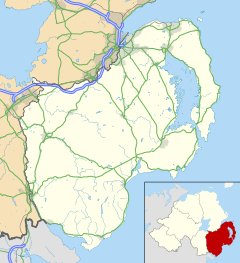Comber, County Down
| Comber | |
|---|---|
| Comber shown within County Down | |
| Population | 9,078 (2011 Census) |
| District | |
| County | |
| Country | Northern Ireland |
| Sovereign state | United Kingdom |
| Post town | NEWTOWNARDS |
| Postcode district | BT23 |
| Dialling code | 028 |
| Police | Northern Ireland |
| Fire | Northern Ireland |
| Ambulance | Northern Ireland |
| EU Parliament | Northern Ireland |
| UK Parliament | |
| Website | comberonline.org |
Comber (from Irish: An Comar, meaning "the confluence") is a small town in County Down, Northern Ireland. It lies 5 miles south of Newtownards, at the northern end of Strangford Lough. It is situated in the townland of Town Parks, the civil parish of Comber and the historic barony of Castlereagh Lower. Comber is part of the Borough of Ards. It is also known for Comber Whiskey which was last distilled in 1953. A notable native was Thomas Andrews, the designer of the RMS Titanic and was among the many who went down with her. It had a population of 9,078 people in the 2011 Census.
The confluence of two rivers, which gave the town its name, is that of the Glen River and the Enler River which meet here. There is believed to have been a church here since the time of St Patrick, while a Cistercian abbey was founded around 1200 on the site of the present Church of Ireland church, a site likely chosen to take advantage of the good access to Strangford Lough. After Henry VIII dissolved the monasteries in 1541, the abbey fell into ruins and its stone has since been used in other buildings.
During the influx of Scots in the early 1600s (see Plantation of Ulster), a settlement grew up at Comber, although it was focused about a mile further south than at present, in the townland of Cattogs, and there is evidence that the settlement was a port used by traders and fishermen. By the 1700s, however, the focus of the town had moved to the area of the present main Square and Comber became established as an industrial centre with several mills.
...
Wikipedia

